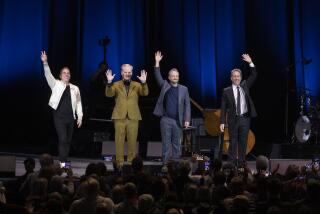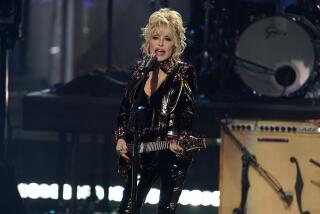Singing his praises
- Share via
It might be lonely at the top, as Randy Newman wrote in one of his funniest pieces of cliche-skewering, but it was certainly crowded on the stage of UCLA’s Royce Hall on Saturday, where the esteemed singer-songwriter’s body of work was treated to a fascinating exploration by a formidable gathering of admirers.
The smooth-running, three-hour-plus show, titled “Shock and Awe: The Songs of Randy Newman,” was created by UCLA Live artist-in-residence Hal Willner and co-producer Janine Nichols, and it figures to take its place in the Los Angeles live-music pantheon with such past Willner landmarks as his salute to folklorist Harry Smith.
Newman’s music is uniquely suited for this kind of treatment. Not only does it unflinchingly cut to the heart of human nature, but it does it in so many tones and viewpoints and in such a variety of musical idioms that there was never a danger of bogging down. The production provided all the musical flexibility anyone would need, with a string and horn section and two separate small bands (one a little rowdy and the other, fronted by guitarist Bill Frisell, more tasteful) coalescing seamlessly into various configurations.
Newman, who did not appear onstage Saturday after playing a solo show Friday at Royce Hall, has received no shortage of acclaim over the decades as one of pop music’s most literary artists, but it was still a revelation to hear his work refracted through the lens of “Shock and Awe.”
From the booming satire of “Political Science” by actor Rip Torn (whose fumbling of the lyric was one of the evening’s few noticeable gaffes) to the painful intimacy of “Old Man,” with Robin Holcomb bringing the hall to pin-drop hush for its deathbed scenario, the program corralled the diverse strands of the Newman oeuvre and assembled them into something whole and coherent, if more mosaic than linear narrative.
Whether on a sweeping historical scale or through penetrating introspection, the vision that emerged was a richly complex cosmology of the human spirit, a portrayal of people ruled by venality and driven by deep-rooted obsessions. But for all the cruelty and creepiness on parade, Newman’s songs and the singers’ performances summoned sympathy for even the most troubling characters. Gavin Friday, for instance, found a strain of defiant affirmation amid the sad self-delusion in the “I know what love is!” rant from “You Can Leave Your Hat On.”
The Irish singer’s cabaret-cum-rock star stance represented the evening’s most flamboyant theatricality, an angle also approached by Jennifer Charles (of the group Elysian Fields) with her sultry, supper-club vamp persona (“You can burn down my cornfield any time,” you could imagine many in the crowd thinking), and actors Torn and John Ventimiglia (from “The Sopranos”), who anchored a flashy, Broadway-style production of “Shame.”
Most of the singers played it straighter, while some, such as Stan Ridgway, were somewhere in between. Among the more gripping matches of performer and song: Vic Chesnutt’s “I Want You to Hurt Like I Do,” David Hidalgo’s “Sail Away” and Victoria Williams’ “Davy the Fat Boy.”
In addition to its dark vision, Newman’s work carries a sense of deep, almost desperate longing for comfort and refuge. It’s a need often denied by human nature -- singer E, covering the Dusty Springfield-recorded “I Don’t Want to Hear It Anymore,” told of someone who learns of his partner’s infidelity through gossip overheard through his thin walls -- or by nature itself, as in the shattering floods described by recently rediscovered soul singer Howard Tate in “Louisiana 1927.”
In contrast, the hymn-like “Going Home” appears to fulfill its message of return, and Los Lobos’ Hidalgo didn’t hunt for irony in his sweet, sincere interpretation. There would be a couple more songs to come, including a rowdy, all-aboard “Mr. President (Have Pity on the Working Man),” but nothing all evening would bring that kind of solace.
More to Read
The biggest entertainment stories
Get our big stories about Hollywood, film, television, music, arts, culture and more right in your inbox as soon as they publish.
You may occasionally receive promotional content from the Los Angeles Times.










